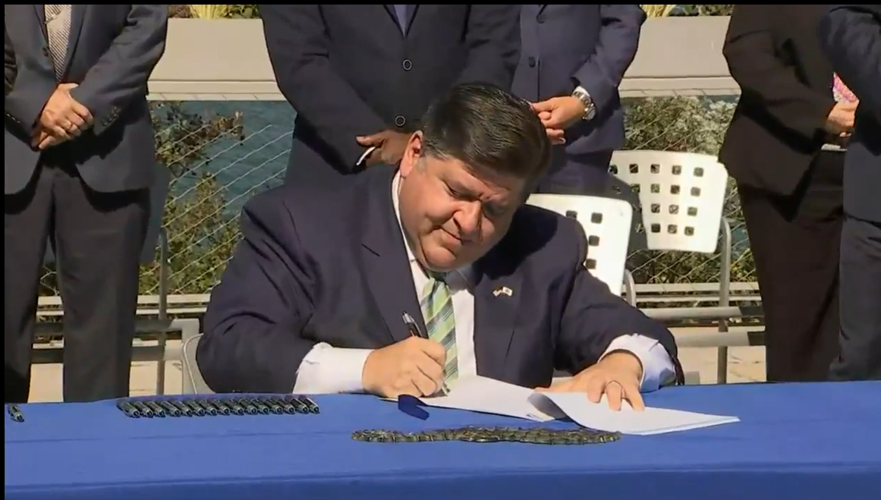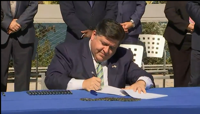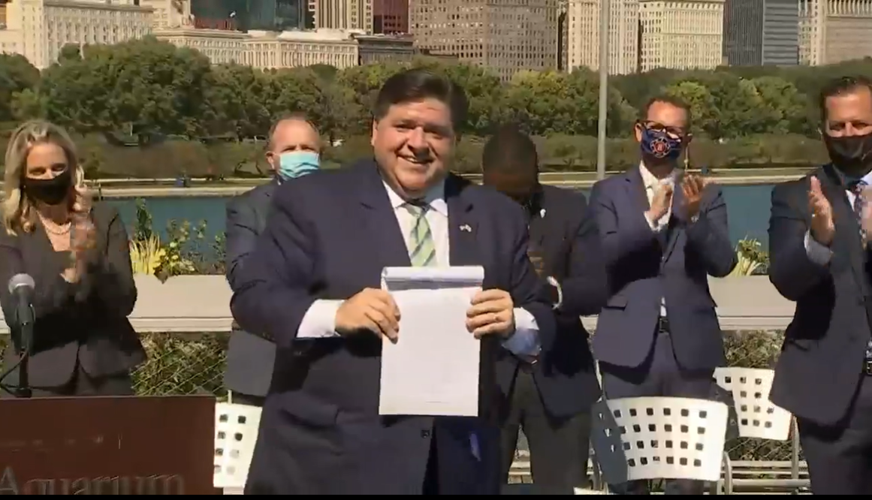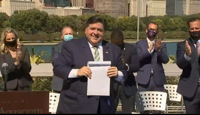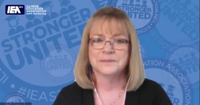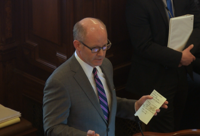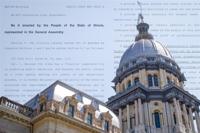(WSIL) -- Governor JB Pritzker signed the controversial energy bill into law Wednesday.
SB18 requires the closure of all private coal-fired and oil-fired electric generating units by Jan. 1, 2030 and required municipal coal to be 100% carbon-free by December 31, 2045, with an interim emissions reductions goal of 45 percent from existing emissions by no later than January 1, 2035.
RELATED:
A major point of concern for Republicans was that the bill could raise energy rates, which could cost consumers $136 million per year under a reconciliation process in the bill that's capped at 5 percent. The average residential customer would pay an additional $3.50 per month.
âWe canât outrun or hide from climate change â� not to the north, where the Boundary Waters burn; not to the south, where Ida swallows lives and livelihoods in the blink of an eye,â said Governor JB Pritzker. âThere is no time to lose. Thanks to the Climate and Equitable Jobs Act, Illinois is taking action in the fight to stop and even reverse the damage thatâs been done to our climate. As of today, Illinois is a force for good, for an environmental future we can be proud of. With economic growth and jobs woven into its fabric, this new law is the most significant step Illinois has taken in a generation toward a reliable, renewable, affordable and clean energy future in a generation.â�
SB2408 aims to:
Combat Climate Change and Invest in Renewable Energy
- Provides that it is the policy of the State of Illinois to move toward 100% clean energy by 2050.
- Makes changes to the Illinois Power Agency (IPA) Act to double the stateâs investment in renewable energy.
- Puts the state on a path to 40% renewable energy by 2030 and 50% by 2040.
- Ensuring that all utility-scale wind and solar projects are built with project labor agreements and that prevailing wages are paid on all non-residential wind and solar projects.
- Requires renewable industry reporting on diversity and inclusion efforts.
- Requires all private coal-fired and oil-fired electric generating units to reach zero emissions by January 1, 2030.
- Requires municipal coal, including Prairie State and CWLP Dallman, to be 100% carbon-free by December 31, 2045, with an interim emissions reductions goal of 45% from existing emissions by no later than January 1, 2035. If that emissions reduction requirement is not achieved by December 31, 2035, they must retire one or more units or reduce emissions by 45% from existing emissions by June 30, 2038.
- Requires all private natural gas-fired units to reach zero emissions by 2045, prioritizing reductions by those with higher rates of emissions and those in and near environmental justice communities.
- Requires municipal natural gas-fired units to reach zero emissions by 2045, unless companies convert units to green hydrogen or similar technology that can achieve zero carbon emissions.
- Requires all units that utilize combined heat and power or cogeneration technology to reach zero emissions by 2045, unless companies convert units to green hydrogen or similar technology that can achieve zero carbon emissions.
- Creates a coal to solar program to support the transition of coal plants to renewable energy facilities.
- Authorizes the Governor to create a commission on market-based carbon pricing solutions.
- Creates a Nonprofit Electric Generation Task Force to investigate carbon capture and sequestration and debt financing options for Prairie State.
- Requires the Illinois Environmental Protection Agency, IPA, and Illinois Commerce Commission (ICC) to jointly conduct a study, every 5 years starting in 2025, on the Stateâs progress toward its renewable energy resources development goals and the current and projected status of electric resource adequacy and reliability throughout the state.
- Requires the ICC to open an investigation to develop and adopt a renewable energy access plan to improve transmission capacity to support renewable energy expansion.
- Permits Ameren to establish up to 2 utility-scale solar pilot projects.
- Permits schools to lease property in excess of 25 years to support renewable energy projects.
Workforce Development
- Creates the Energy Transition Assistance Fund to allocate funding from ratepayers to support $180 million in state clean energy programs.
- Allows local governments to engage in community energy and climate planning.
- Creates a displaced energy workers bill of rights to provide state support to transitioning energy sector workers, administered by the Department of Commerce and Economic Opportunity (DCEO) and the Illinois Department of Employment Security (IDES).
- Creates a Clean Jobs Workforce Network Hubs Program, establishing 13 program delivery hub sites that leverage community-based organizations to ensure members of equity-focused populations have dedicated and sustained support to enter and complete the career pipeline for clean energy and related sector jobs.
- Establishes Energy Transition Navigators to provide education, outreach, and recruitment to equity-focused populations to ensure they are aware of workforce development programs.
- Establishes three Climate Works Hubs throughout the state which will be administered by DCEO and will recruit, prescreen, and provide pre-apprenticeship training to equity focused populations.
- Creates a clean energy contractor incubator program to provide access to low-cost capital and financial support for small clean energy businesses and contractors.
- Creates a returning residents clean jobs training program to provide training for careers in the clean energy sector to individuals who are currently incarcerated.
- Creates a clean energy primes contractor accelerator program to mentor and support businesses and contractors through business coaching and operational support.
- Creates a jobs and environmental justice grant program to provide upfront and seed capital to support community ownership and development of renewable energy projects.
- Establishes the Energy Workforce Advisory Council within DCEO to make recommendations to the state on clean energy workforce programs.
Establishes Transition Programs and Assistance
- Creates an Energy Transition Workforce Commission to report on anticipated impacts of transitioning to a clean energy economy and recommend changes to the workforce through 2050.
- Requires DCEO to establish an energy transition barrier reduction program.
- Requires DCEO to establish a grant program to award grants to promote economic development in eligible, transitioning communities.
- Requires DCEO, in collaboration with IDES, to implement a displaced worker bill of rights that provides benefits to displaced energy workers.
- Requires DCEO to administer a transition scholarship program to support youth who are deterred from attending or completing an educational program at an Illinois institution of higher education because of his or her parentâs layoff from a retiring power plant.
- Requires DCEO to create or commission a report on the energy worker and transition programs.
- Allows units of local government to establish Community Energy and Climate Plans, which are intended to aid local governments in developing a comprehensive approach to combining different energy and climate programs and funding resources.
- Requires plant owners to notify employees and public officials of a plant closure two years in advance.
Consumer Protections
- Eliminates the customer deposit requirement and late fees for low-income utility residential customers.
- Eliminates the online payment fee for all customersâ� utility bills.
- Requires utility companies to accurately report to the ICC on the number of shutoffs and reconnections on a monthly basis.
- Provides utility-funded compensation to non-profit representatives of consumer interests that intervene in ICC proceedings in order to increase public engagement and transparency, expand information available to the ICC, and improve decision-making.
- Requires the ICC to conduct a comprehensive study to assess whether low-income discount rates for residential customers are appropriate and consider the design and implementation of such rates.
- Requires the ICC to initiate a docket to provide for the refunding of excess deferred income taxes by the end of 2025.
- Prevents municipal and cooperative electric providers from imposing discriminatory financial repercussions on customers who self-generate electricity.
Clean Transportation
- Establishes a goal of adopting 1,000,000 electric vehicles in Illinois by 2030.
- Requires electric utilities to file electrification plans with the ICC to support the rapid deployment of electric vehicles and make-ready infrastructure statewide.
- Requires IEPA to award rebates to help fund up to 80% of the cost of the installation of charging stations and requires recipients to pay prevailing wage on installation projects.
- Creates an Electric Vehicle Coordinator within IEPA.
- Requires the Department of Transportation to conduct a study to consider how the adoption of EVs will adversely affect resources needed for transportation infrastructure.
- Creates an up to $4,000 rebate for consumers who purchase an electric vehicle, regardless of where they reside in Illinois.
Expands Ethics Reforms
- Expands statement of economic interest requirements to include any spouse or immediate family member employed by a public utility in Illinois.
- Subjects the Illinois Power Agency to ex-parte communication requirements.
- Creates a Public Utility Ethics and Compliance Monitor to ensure utility companies are meeting the highest level of ethical standards.
- Requires the ICC to initiate an investigation into how ratepayer funds were used in connection with the conduct outlined in ComEdâs Deferred Prosecution Agreement, potentially putting refunds back into residential ratepayersâ� pockets.
- Requires each utility to establish the position of a Chief Ethics and Compliance Officer who must submit annual reports to the ICC.
Ends Formula Rates
- Ends formula rates and transitions to performance-based ratemaking.
- Requires an independent audit of the current state of the grid and expenditures made since 2012.
- Requires utilities to file a Multi-Year Rate Plan where they will be rewarded and penalized based on achievement of ICC-approved performance metrics, which will be based on reliability and resiliency, peak load reductions attributable to demand response programs, supplier diversity expansion, affordability, interconnection response time, and customer service performance.
- Requires annual performance evaluations to evaluate utilitiesâ� performance on their metric targets during the previous year.
- Requires utilities to file a Multi-Year Integrated Grid Plan to support the stateâs clean energy goals and comprehensive grid planning.
- Creates a new Division of Integrated Distribution Planning at the ICC.

